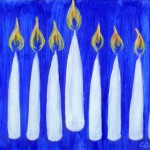Hanukkah, the Jewish holiday also known as the Festival of Lights, began this year on Saturday at sundown and continues for eight days. It commemorates the rededication of the second temple in Jerusalem after the Jewish rebel army, the Maccabees, revolted and regained control of Judea from the Seleucid Greeks. This happened about 165 years before Jesus was born, during the 400 “silent” years between the Old and New Testament, a time of injustice and persecution. Jewish customs, such as the reading of the Torah and circumcision, had been outlawed and the holy temple defiled with swine.
Many Christians are not interested in Jewish holidays; some might even be afraid of learning more. But two reasons compel me on that quest. First, Jesus, as a Jewish boy, would have faithfully celebrated every festival. Second, the Old Testament symbolism that points to Christ is rich in meaning and part of the heritage all believers in God share. The only difference is that we believe the end of the story, the coming of Messiah, has already been fulfilled.
The Light will never be extinguished.
This Jewish festival is all about light. Jesus called Himself the “Light of the world” and said that “he who follows Me will not walk in the darkness, but will have the Light of life.” (John 8:12). His light is eternal.
Several symbols are connected with Hanukkah. The centerpiece of it all is a nine-branched candelabrum called a menorah. Each of the eight nights, an additional candle is lit, with all eight being illuminated on the final night of Hanukkah. One branch (called a shamash) is raised above the others. It is used to light the other candles and is not to be snuffed out.
In Judaism, candlelight is a reminder of God’s divine presence. Candles lit during Jewish holidays and on Shabbat (Sabbath) set those days apart as holy and distinct from day-to-day life.
God will provide what we need.
During the rededication of the temple, the people were to celebrate for eight nights, but they only had a small flask of oil that would provide light for just one night. The miracle of Hanukkah is that the supply of oil did not run out.
Hanukkah reminds us that God will provide. According to Phil. 4:19, “My God will supply all your needs according to His riches in glory in Christ Jesus.” His riches in Jesus are inexhaustible, just like the oil. His provision is always enough.
Another token of Hanukkah is the dreidel, a four-sided spinning top. Letters from the Hebrew alphabet are written on each side, making an acronym for the words “A Great Miracle Happened Here,” referring to the miracle of the oil lasting as long as it was needed. Jewish children play games with the spinning dreidel after the candles are lit.
Gold coins called gelt (Yiddish for money) are traditionally given as gifts during the holidays. Today, many Jewish families give presents similar to Christmas stocking stuffers each of the eight evenings. Customary food includes latkes (potato pancakes) and fruit-filled doughnuts. Both are symbolic because they are fried in oil and remind us of the miracle of the oil that never ran dry.
At Christmastime, we celebrate the coming of the Light that entered our world and longs to take up residence in our hearts. “In Him was life, and the life was the Light of men. The Light shines in the darkness,and the darkness did not comprehend it.” (John 1:4-5).
Happy Hanukkah and Merry Christmas!